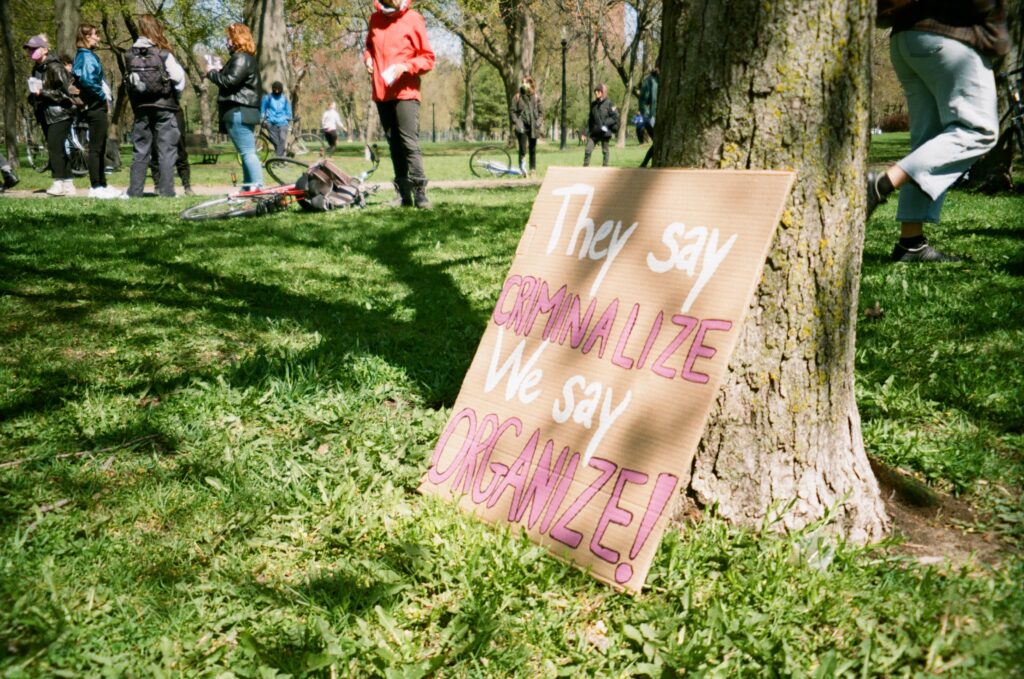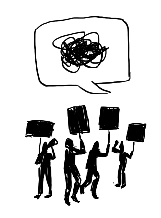« WE don't want to be saved! we want rights!»
Sex Workers Demands Full Decriminalization of their Work

Sex workers cannot be ignored anymore. In unceded territories that we call Canada, like elsewhere around the world, they continue to be targeted by harmful policies that criminalize sex work and sex workers, under the guise of saving them from human trafficking and sexual exploitation. Far from reaching their goals of eradicating the sex industry, these policies instead marginalize and isolate sex workers from social and legal services, and increase their vulnerability to violence. In response to this repression, sex workers organize to demand better working conditions and equally, worker status with the rights and social protections that comes with that. We argue that it isn’t the nature of the work itself (the exchange of sexual services for money) that exposes sex workers to violence, but rather the repressive laws that govern it.
The implementation of the Protection of Communities and Exploited Persons Act (PCEPA) in 2014 made sex work illegal for the first time in Canada. The PCEPA prohibits communicating for the sale of sex in a public space; prohibits advertising the sexual services of another person; prohibits profiting materially from sex work; and criminalizes the purchase of sexual services in any and all contexts. This legislative regime, advocated by many anti-prostitution feminist groups, claims to eliminate demand by criminalizing clients and third parties in order to abolish the sex industry. In fact, since its passage, this law has made sex workers more precarious and vulnerable to violence. By representing sex workers as victims, these laws normalize rather than combat violence against them.
Indeed, these laws create unsafe and exploitative work environments and maintain substandard working conditions. These conditions are the source of sex workers’ daily worries, ranging from difficulties in getting paid to the impossibility of denouncing violence by clients, employers and law enforcement through legal procedures. For those who work independently, criminalization remains an issue, as clients are less likely to provide important security information such as their real identity. This makes it difficult for sex workers to create and maintain important safety mechanism at work, and has led to the murder of several sex workers. For those who work on the street, the prohibition on communicating for the sale of sexual services in public spaces (near parks, schools and daycares) means that they end up working in secluded, poorly lit areas – out of reach of being witnessed – putting them at greater risk of violence. Immigration laws in addition to criminal provisions around sex work encourage more surveillance of migrant sex workers in the industry, and as a result, they may face loss of status, detention, and deportation if their work is discovered – even if they work in legal sectors of the industry such as licensed massage parlors and strip clubs.
Decriminalization was implemented in New Zealand 20 years ago, and as a result, sex workers are able to put safety mechanisms into place for their work and seek recourse when they experience violence on the job. This government has just started to initiate its mandated task of studying the impacts of PCEPA, even though it should’ve been done five years after its implementation. Time is running out, as sex workers continue to suffer the impacts of criminalization!
We need to repeal the Protection of Communities and Exploited Persons Act and decriminalization of sex work now!
This letter was signed by 77 individuals and 56 organizations, all over the unceded indigenous territories that we call Canada, in different sectors: unions, academic, arts, harm reduction, STI prevention, women, migrant, indigenous and trans rights.
Organizations:
- Tables des organismes montréalais de lutte contre le sida (TOMS)
- Stella, l’amie de Maimie
- Sex Professionals of Canada (SPOC)
- Sex Workers of Winnipeg Action Coalition (SWWAC)
- Answer Society
- HIV Legal Network
- Peers Victoria Resources Society
- Projet LUNE
- Solidarité Sans Frontière
- Après l’Asphalte
- Tout.e ou pantoute podcast
- Closet space Winnipeg
- Defund the police
- Plein Milieu
- Centre Associatif Polyvalent d’Aide hépatite C (CAPAHC)
- Chapitre Montréalais des Socialiste Démocratiques du Canada
- Projet Intervention Prostitution Québec (PIPQ)
- Fondation Filles d’Action
- AlterHéros
- 2fxflematin
- Syndicat des travailleuses et travailleurs en intervention communautaire (STTIC-CSN)
- Aide aux trans du Québec (ATQ)
- No Borders Media
- Queer McGill
- Midnight Kitchen
- Collectif Un Salaire Pour Toustes les Stagiaires (SPTS)
- Collectif Opposé à la Brutalité Policière (COBP)
- REZO -santé et mieux-être des hommes gais et bisexuels, cis et trans
- BRUE
- PIAMP
- Pivot Legal Society
- Réseau d’aide aux personnes seules et itinérantes de Montréal (RAPSIM)
- Sphère – Santé sexuelle globale
- Dopamine
- AIDS Community Care Montreal (ACCM)
- Defund Network 604
- Projet de Travailleurs de Soutien aux Autochtones (PTSA)/Indigenous Support Workers Project (ISWP)
- Indigenous Sex Work and Art Collective (ISWAC)
- Game Workers Unite Montréal
- Rue Action prévention (RAP Jeunesse)
- Sex Worker Aotearoa Network
- Maggie’s Toronto Sex Workers Action Project
- PIECE Edmonton
- Moms stop the harm
- Collectif NU.E.S
- Centre for Gender & Sexual Health Equity
- AGIR: Action LGBTQ+ avec les immigrant.es et les réfugié.es
- Comité d’intervention infirmière anti-oppressive (UdeS)
- Les 3 sex*
- Quebec Public Interest Research Group (QPIRG) Condordia
- Association des travailleuses et travailleurs de rue du Québec (ATTRueQ)
- Sex Workers Industrial Movement (SWIM)
- Collages féminicides Montréal
- IRIS Estrie
- HIV Community Link Society
- Syndicat Associatif des Travailleu.ses.rs Autonomes du Québec (S’ATTAQ)
Individuals:
- Maria Nengeh Mensah – Professor
- Dr Gary Kinsman
- Kamala Kempadoo – Professor
- Dr Mary Sherman – Co-coordinator of the Indigenous Support Worker Project
- Mollie Bannerman – Director of Women & HIV/AIDS Initiative
- Louise Toupin – Ally
- Marlihan Lopez – Coordinator of Simone de Beauvoir Institute et vice-president of the Fédération des femmes du Québec (FFQ)
- Ted Rutland – Professor et writer
- Kiki Lafond – Coordinator of the sex work programm at RÉZO
- Robert Paris – Director of Pact de Rue
- Audrey Monette – Criminologist
- Mary-Anne Poutanen
- Christine Wingate – Director of Moms Stop The Harm
- Petra Schulz – Cofounder of Moms Stop The Harm
- Fadwa Bahman – Communications coordinator for Queer McGill
- Dr. Jess Rowan Marcotte – Community organizer and artist
- Émilie Roberge – Community organizer on overdose prevention at TOMS and student in social work
- Laura Augustin – Researcher
- Pam Plourde – Sexologie doctoral candidate
- Alexandre Lamontagne – Student in social work
- Chacha Enriquez- College professor
- Marie LaRochelle – NPO consultant and podcaster
- Laurence Bouchard – Special educator
- Seeley Quest – Activist
- Ana Vujosevic – Coordinator of the Women and HIV/AIDS Initiative (WHAI) Coordinator at Moyo Health and Community Services
- Jean-Philippe Bergeron – Outreach worker at Dopamine
- Dr. Nathan Dawthorne – Anthropologist, male sex work researcher, mental health advocate
- Angela Carter – Outreach worker
- Donny Basilisk – Sex woker
- Zakiyyah Boucaud – Student and sex worker
- Dawn-Marie – Community helper
- Megane Christensen – Outreach worker
- Amélie Ouimet – Sexologist
- Anaïs Gerentes – Candidate à la maîtrise en travail social
- Tonye Aganaba – Musician and community worker
- Britany Thiessen – Union officer
- Rosalie Vaillancourt – Comedian
- Mallory Lowe – Visual Artist
- Léo Mary- Communication coordinator at TOMS
- Anne Archet- Writer
- Sandrine Blais – Counselor
- Josée Leclerc – Counselor
- Melina May – Sex worker and activist at SWAC
- Adore Goldman – Sex worker and activist at SWAC
- Samantha Knoxx – Sex worker
- Pandora Black – Sex worker and activist
- Kristen Wiltshire – Activist
- Jelena Vermilion
- Francis Sheridan Paré
- Maxime Holliday
- Sam Funari
- Magdalene Klassen
- Jesse Dekel
- Lana Amator
- Rida Hamdani
- Gaëlle Anctil-Richer
- Ellie Ade Kur
- Valérie Comeau
- Mason Windels
- Lysandre M.G.
- Éliane Bonin
- Nadia Duguay
- Moriah Scott
- Virginia Potkins
- Chanelle Deville
- Sophie Hallée
- Ivy Sinclair
- Catherine Desjardins-Béland
- Jonathan McPhedran Waitzer
- Rev David Driedger
- Roxane Barnabé
- Raphaëlle Auger
- Mallory Bateman
- Juliette Pottier-Plaziat
- Charlie Fraser
- Geneviève Smith-Courtois
- Heather Day
